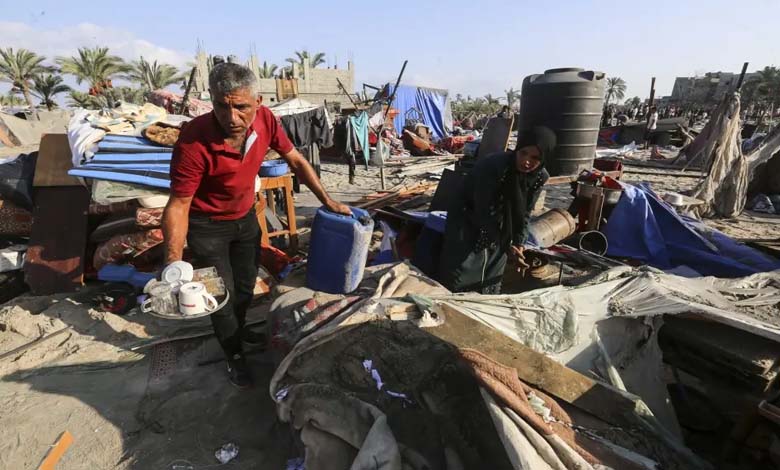A mysterious forced journey reignites European concerns over the displacement of Palestinians

Europe’s position is undergoing a real test: it remains, in principle, committed to rejecting forced displacement, but it must now prove that this stance is not merely a declaratory principle, but a policy that can be enforced.
-
Turkey seeks to secure safe passage for dozens of fighters trapped in a tunnel in Gaza
-
The coexistence of opposites in Gaza: life pulsing among the dead
European Commission spokesperson Anwar Al-Aouni reiterated the EU’s rejection of any forced displacement of Palestinians from the Gaza Strip, stressing that “Gaza is an essential part of the future Palestinian state, and there must be no forced displacement.” He made the comments during his daily press briefing in response to questions about the mysterious arrival of Palestinians from Gaza in South Africa on a flight that originated from Israel.
This European stance comes at a politically sensitive moment marked by growing questions about what is actually happening in Gaza, especially amid increasing reports and testimonies warning of possible population transfers or pressure driving civilians to leave under the conditions of war. Although the EU’s official discourse maintains its rejection of displacement and demographic change, its reaction to events on the ground remains cautious, as reflected in statements that leave room for “investigation” and “verification” and avoid issuing categorical conclusions.
-
Ruling Gaza Until 2027: Details of the U.S. Draft Resolution at the UN Security Council
-
Ruling Gaza Until 2027: Details of the U.S. Draft Resolution at the UN Security Council
Al-Aouni noted that he lacked detailed information about the incident, adding, “Nevertheless, our position remains unchanged. The European Union rejects any demographic or territorial changes in Gaza.” He also reaffirmed Brussels’ support for integrating Gaza with the West Bank, recalling that “as President Ursula von der Leyen has said, Gaza is a key component of the future Palestinian state, and there must be no forced displacement.”
Paula Pinho, the European Commission’s chief spokesperson, stated that the matter still requires investigation to determine whether what happened constitutes “forced displacement or voluntary departure.”
-
Secret U.S. Report: Hundreds of Israeli Violations in Gaza Under Investigation
-
Safe Corridor… Details of a New US Offer to Hamas in Gaza
Between declared principles and concern over field realities
This caution highlights a long-standing dilemma: on the one hand, the desire to uphold international legal norms; on the other, the absence of political will to exert real pressure on Israel. While the EU insists that Gaza is a core element of the future Palestinian state, its ability to influence developments remains limited, particularly due to internal divisions among member states regarding how to address Israeli policies.
The EU thus finds itself compelled, in its public positions, to hold onto a strict legal framework—rejecting displacement, refusing border changes, reaffirming the two-state solution—because it knows that any imposed demographic change in Gaza would undermine the political framework it has defended for decades and expose it to a credibility crisis on the international stage. At the same time, Europeans are observing with growing concern developments that could gradually reshape Gaza’s demographic reality under the guise of “voluntary departures” or “travel to third countries”.
-
Israeli raids on Gaza: the heaviest loss of life in a single night since the ceasefire
-
After the Truce… a Silent Enemy Threatens Gaza
On 13 November, authorities at OR Tambo Airport in Johannesburg detained 153 Palestinians for nearly 13 hours after their arrival on a connecting flight that originated from Israel’s Ramon Airport via Kenya, due to the absence of an Israeli exit stamp on their passports. After verification, South Africa’s border security authorities allowed them entry under existing exemptions permitting Palestinian passport holders to stay for up to 90 days.
While Israel’s Coordination of Government Activities in the Territories stated that the Palestinians had left Gaza after securing approval from a third country, observers warn that such procedures may create a new pathway for displacement under legal pretexts, setting a dangerous precedent in the current context.
-
New Gaza between American Opportunity and Palestinian Fears
-
Harsh living and the specter of war: Gaza’s exhausted residents still suffering
South African President Cyril Ramaphosa said his government was investigating the circumstances of the Palestinians’ arrival, “who were placed under mysterious conditions on a plane and routed through Nairobi,” stressing the need to understand the background of the flight and assess its potential implications.
In light of these developments, Europe’s stance appears to be entering a genuine testing phase: it remains theoretically opposed to displacement, but now must demonstrate that this is more than a principled statement and is instead a policy that can be enforced. As more mysterious cases of Palestinians leaving Gaza emerge, pressure is mounting on Brussels to clarify its tools and its actual willingness to prevent any demographic changes imposed by the evolving reality on the ground.












